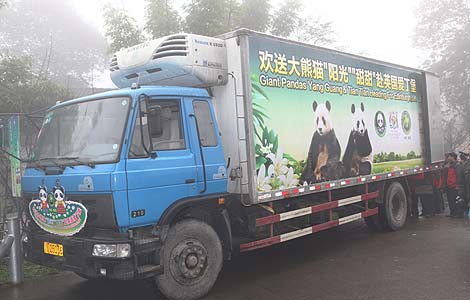Reforms to target income tax system
Updated: 2011-12-12 07:36
By Zhao Yinan (China Daily)
|
|||||||||
HAIKOU - Fundamental reforms of China's personal income tax system are expected to be put into place in three years, a senior expert said.
The reforms are likely to introduce a tax system based not only on a person's annual income but also on economic burdens or expenses in families.
The current personal income tax system, by contrast, sets a nationwide threshold and does not take individual economic expenses into account, the expert said.
Jin Dongsheng, deputy director of the semi-official tax institute under the State Administration of Taxation, said the existing system is "far from the goal of income redistribution" and needs to be revised to be fairer.
"Two people can shoulder immensely different burdens even though both of them receive similar payments every month," Jin said.
"Those who have to support the aged and the young in the family should not be taxed the same as bachelors."
Jin, who was speaking at a recent forum on income distribution at the China Institute for Reform and Development in Hainan province, said one possible solution to the problem would be to establish a system that refunds taxpayers according to their family burdens and expenditure.
China raised its personal income tax threshold to 3,500 yuan ($540) a month from 2,000 yuan in September, in a bid to boost domestic consumer demand and bridge income disparities.
The attempt, however, has been described as too "superficial" as it failed to deal with the essence of the issue: reform of the country's taxation system.
Chen Sixi, a lawmaker, has urged the State Council to investigate tax reimbursement, saying that poor people in China spend "a considerable amount of their money on supporting the young and the aged", and that money should be refunded to encourage domestic consumption and promote income redistribution.
Jin Dongsheng, while agreeing with Chen, said another shortcoming of the current system is that it does not tax people's extra-wage income, which can "constitute a substantial part of income for those working in monopoly industries".
The continuing reform process, Jin explained, is tackling problems higher up in the system, but technical problems remain before the changes can take effect.
"The third phase of the Golden Tax Project is going to be completed soon," he said. "Once established, it will enable the taxation authority to track the sources of people's income, even if they are paid by more than one employer in different regions.
"By collecting valid information on a person's income and expenditures, the system will serve as a basis for the coming tax changes."
The Golden Tax Project, a network connecting the national tax system with provincial and township revenue bureaus, is designed to prevent tax evasion by enabling the system to check a person's tax payment with his or her ID number.
China's revenue from personal income tax totaled 483.7 billion yuan in 2010, accounting for 6.3 percent of the country's tax haul, the Ministry of Finance said.











